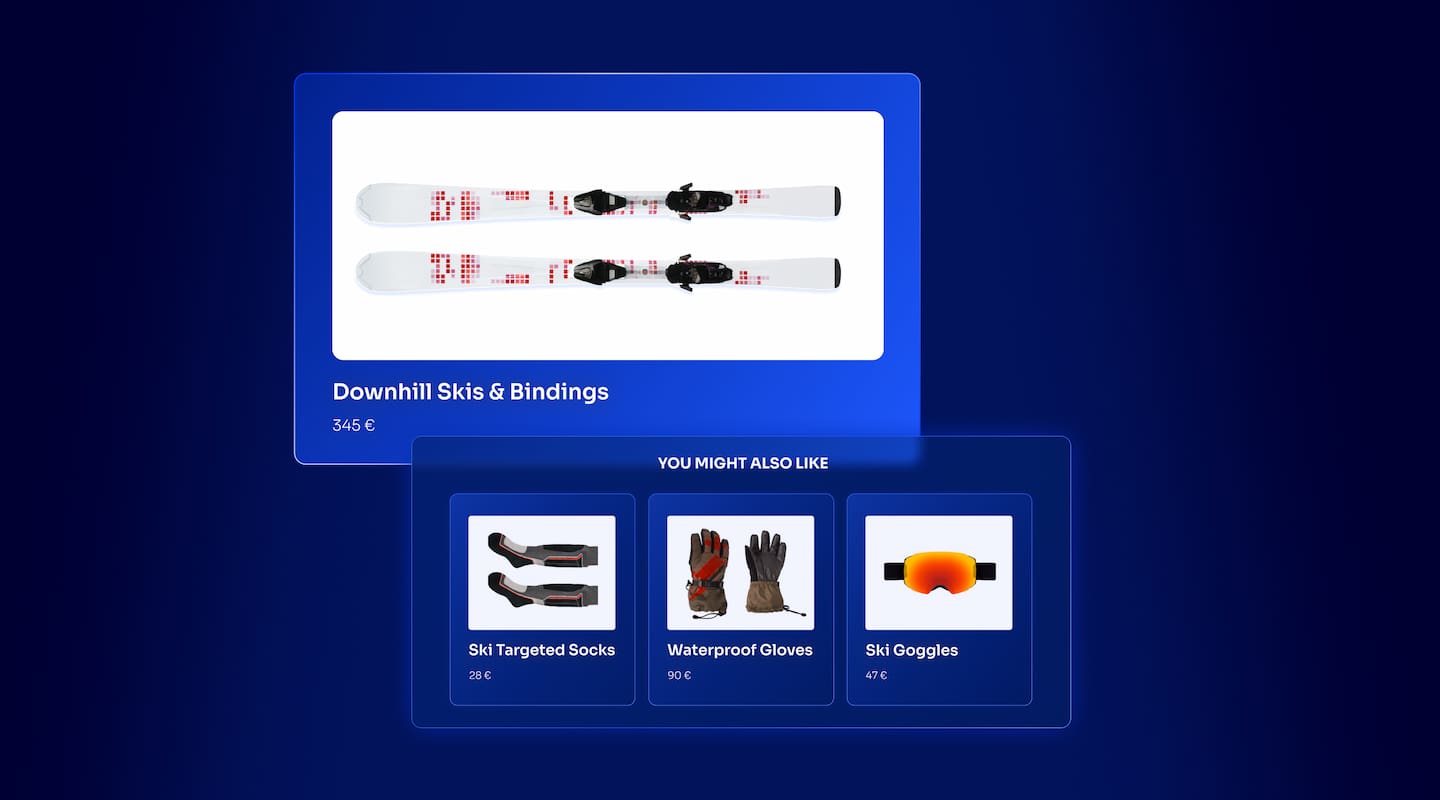Add InstantSearch and Autocomplete to your search experience in just 5 minutes
A good starting point for building a comprehensive search experience is a straightforward app template. When crafting your application’s ...
Senior Product Manager


A good starting point for building a comprehensive search experience is a straightforward app template. When crafting your application’s ...
Senior Product Manager

The inviting ecommerce website template that balances bright colors with plenty of white space. The stylized fonts for the headers ...
Search and Discovery writer

Imagine an online shopping experience designed to reflect your unique consumer needs and preferences — a digital world shaped completely around ...
Senior Digital Marketing Manager, SEO

Winter is here for those in the northern hemisphere, with thoughts drifting toward cozy blankets and mulled wine. But before ...
Sr. Developer Relations Engineer

What if there were a way to persuade shoppers who find your ecommerce site, ultimately making it to a product ...
Senior Digital Marketing Manager, SEO

This year a bunch of our engineers from our Sydney office attended GopherCon AU at University of Technology, Sydney, in ...
David Howden &
James Kozianski

Second only to personalization, conversational commerce has been a hot topic of conversation (pun intended) amongst retailers for the better ...
Principal, Klein4Retail

Algolia’s Recommend complements site search and discovery. As customers browse or search your site, dynamic recommendations encourage customers to ...
Frontend Engineer

Winter is coming, along with a bunch of houseguests. You want to replace your battered old sofa — after all, the ...
Search and Discovery writer

Search is a very complex problem Search is a complex problem that is hard to customize to a particular use ...
Co-founder & former CTO at Algolia

2%. That’s the average conversion rate for an online store. Unless you’re performing at Amazon’s promoted products ...
Senior Digital Marketing Manager, SEO

What’s a vector database? And how different is it than a regular-old traditional relational database? If you’re ...
Search and Discovery writer

How do you measure the success of a new feature? How do you test the impact? There are different ways ...
Senior Software Engineer

Algolia's advanced search capabilities pair seamlessly with iOS or Android Apps when using FlutterFlow. App development and search design ...
Sr. Developer Relations Engineer

In the midst of the Black Friday shopping frenzy, Algolia soared to new heights, setting new records and delivering an ...
Chief Executive Officer and Board Member at Algolia

When was your last online shopping trip, and how did it go? For consumers, it’s becoming arguably tougher to ...
Senior Digital Marketing Manager, SEO

Have you put your blood, sweat, and tears into perfecting your online store, only to see your conversion rates stuck ...
Senior Digital Marketing Manager, SEO

“Hello, how can I help you today?” This has to be the most tired, but nevertheless tried-and-true ...
Search and Discovery writer
Voice search, also known as voice-enabled search, lets people request information by speaking rather than entering text in a search box. The trend toward simplifying and streamlining the search process for improved user experiences has fueled the development of voice search technology. This popular user interface can save time and reduce exertion by replacing keyboard-entered queries.
Voice will always be humanity’s best communication tool, and that reason alone makes voice search a compelling option. Here are a few statistics that illustrate the growing importance of search using voice technology and voice-enabled devices:
With the surge in online shopping related to the pandemic and the huge influx of new products to online marketplaces, experts predict even more demand for voice-centric user experiences.
Searching by voice saves time by eliminating the need to pull up a search engine web page and input a question in a search box. From reviews of local restaurants to the latest sports scores, voice search makes information access spontaneous, convenient, and easy. And when search engines use advanced natural language understanding to generate desired answers, this technology can become a trusted “consultant.”
Voice search eCommerce simplifies the process of finding products and exploring buying options. Voice-driven shopping is markedly faster than entering text in an online search box, and it offers new opportunities for personalized, barrier-free searches and upsells.
For example, suppose you’re shopping online, and just before finalizing your order, a voice-enabled shopping assistant tells you about a tantalizing add-on to your order for a dollar more. Chances are good that you’ll pay attention, and you may very well add the item to your purchase.
According to WhatIs.com, popular applications for voice search include:
Accuracy in voice search requires the effective use of artificial intelligence (AI) and machine learning. AI makes the voice feature smart enough to capture shopping behavior and habits.
AI-based natural-language understanding (NLU), makes it easy for users to consistently find what they’re seeking, even if they’re not sure exactly what they need. Instead of entering a keyword that leads to “No results found,” a user can simply ask a question in plain language, for example, “highly rated romantic comedy movies from the 1990s”
By harnessing the power of AI and NLU to detect important details, plus the speaker’s intent, Algolia breaks down the important segments of an oral request and deduces exactly what the user wants. From an eCommerce standpoint, this gets customers to their desired products more quickly, leading to more conversions and increased sales revenue.
In addition, through analysis of prior purchases, a voice assistant can remind online shoppers about products they’ve bought and might want to buy again. Not only is this type of unprompted guidance an added convenience for shoppers, it can serve as a business booster for marketers and brands.
More than a decade ago, the mobile device and smartphone revolution took the world by storm, catching many developers and marketers off guard. Now, voice search is creating the same sort of upheaval, enabled by several popular iOS and Android apps and devices. Here are a few products and services that have practically become household names:
“Hey Google” is all it takes to launch this digital voice-based app. Google Assistant uses the Google search index to find answers to queries, delivering a spoken response based on the information it receives. Essentially, Google Assistant does the Googling for users. The functionality of Google Assistant can also be extended with Google Actions, or third-party applications that brands can create and users can call to interact with the brands or add new functionality to their assistant.
Google’s stand-alone smart assistant devices use Google Assistant. Google Home is a small speaker device, while Google Home Hub adds a screen. The screen is particularly helpful for someone who learns better by watching as opposed to hearing. Google Home Hub can show graphics and videos to clearly illustrate how something is done.
Similar in functionality to Google Assistant, Alexa can find answers to specific queries, as well as answer general questions about matters like the weather and sports. Developers and brands can build skills, or standalone voice apps that live on the Alexa platform.
Voice-based digital assistant Siri has been embedded in every iPhone sold since 2011. To put that captivating voice at your command, all you have to say is “Hey Siri.”
Cortana is a virtual assistant developed by Microsoft that also uses Bing to perform tasks and answer questions posed by users. Cortana offers assistance in English and seven other languages.
Many companies are using Voice Search and voice-response technology to define and promote their brands online. Here are four examples that stand out:
Johnnie Walker uses voice search to promote the features and quality of its Scotch whiskey to shoppers on its website, helping build brand affinity and customer loyalty. Visitors are asked questions about their preferences in whiskey. Their responses lead to a recommendation of the Johnnie Walker product or products most appropriate for them.
In 2017, this global brand launched its GoodNes skill for Amazon Alexa: a visual and voice browsing experience for customers who enjoy cooking. Aside from Alexa, GoodNes offers a visual guide that runs on Safari or Chrome on either a desktop PC or a mobile device.
The Domino’s voice assistant, “Dom,” automates pizza ordering by phone to ensure that the process is convenient and quick. Dom takes people’s orders and checks their order status. Dom is central to the company’s strategy of incorporating voice-activated digital technology in its ordering and customer-service pipelines.
This premium tequila brand partners with several virtual assistants, including Amazon Alexa and Google Assistant. Voice-activated “bartenders” on the Patrón website share Patrón Cocktail Lab recipes, how-to videos, tips, and recommendations with the company’s target audience.
Algolia is working hard to promote voice search as a way of enriching the user experience and improving the functionality of our customers’ websites. By employing query understanding, artificial intelligence, personalization, and search relevance — technologies that are easily implemented on the web, on mobile, and in voice-first applications — you can take your search capabilities to new heights.
For more information about the Algolia approach to voice search, see:
Voice Search statistics you need to know for 2020
Voice Commerce: The Future of Search & E-commerce
Voice search lessons: best practices for building a great voice experience
VP Corporate Marketing
Assess your search experience in less than 5 minutes.

Powered by Algolia Recommend